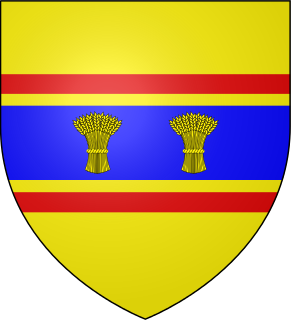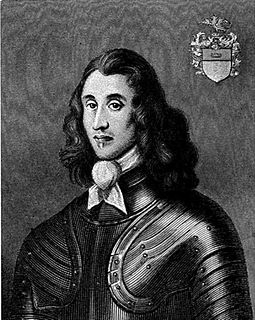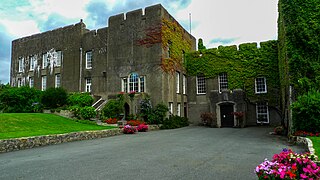Related Research Articles

General at Sea Robert Blake was an English naval officer who served as the Lord Warden of the Cinque Ports from 1656 to 1657. Blake is recognised as the chief founder of England's naval supremacy, a dominance subsequently inherited by the British Royal Navy well into the early 20th century. Despite this, due to deliberate attempts to expunge the Parliamentarians from historical records following the Stuart Restoration, Blake's achievements tend to remain unrecognized. Blakes' successes have been considered to have "never been excelled, not even by Nelson" according to one biographer.
John Desborough (1608–1680) was an English soldier and politician who supported the parliamentary cause during the English Civil War.
Colonel Philip Jones was a Welsh military leader and politician who sat in the House of Commons between 1650 and 1656. He rose to the rank of Colonel in the service of the Parliamentary Army under Fairfax during the English Civil War. As Governor of Swansea he successfully held the town against the Royalist forces.

John Weaver was an English politician who sat in the House of Commons at various times between 1645 and 1659. He supported the Parliamentarian side in the Civil War
James Philipps was a Welsh politician who sat in the House of Commons between 1653 and 1662. He was a supporter of the Parliamentary cause during the English Civil War.

Charles Worsley was an English soldier and politician. He was an ardent supporter of Oliver Cromwell and was an officer in the Parliamentary army during the English Civil War and the Commonwealth of England. He sat in the House of Commons in 1654 and governed a district during the Rule of the Major-Generals.
Richard Norton of Southwick Park, was an English landowner and politician who sat in the House of Commons at various times between 1645 and 1691. He was a colonel in the parliamentary army in the English Civil War and for a time he commanded the Parliamentary forces besieging Basing House. He was Governor of Portsmouth for Parliament during the Civil War and for Charles II after the Restoration.
Thomas Pury was an English politician who sat in the House of Commons variously between 1640 and 1659. He fought on the Parliamentarian side in the English Civil War.
Sir Hugh Owen, 1st Baronet was a Welsh politician who sat in the House of Commons variously between 1626 and 1660. He sided originally with the Parliamentarian side in the English Civil War, but the strength of his allegiance was in doubt.

Sir Anthony St John was an English Member of Parliament (MP) who sat in the House of Commons in 1624 and 1625. He supported the Parliamentary side in the English Civil War.
James Stephens was an English politician who sat in the House of Commons between 1656 and 1660.
Herbert Morley was an English politician who sat in the House of Commons variously between 1640 and 1667. He fought for the Parliamentary army in the English Civil War. Later he was appointed Lieutenant of the Tower of London.
William Neast was an English politician who sat in the House of Commons in 1653 and in 1656.
John Bingham (1613–1673) was an English politician who sat in the House of Commons between 1645 and 1659. He served in the Parliamentary army in the English Civil War.
Richard Price was a Welsh politician who sat in the House of Commons in 1653. He fought in the Parliamentary army in the English Civil War.
Thomas Pury was an English politician who sat in the House of Commons from 1640 to 1653. He supported the Parliamentarian cause in the English Civil War.
Christopher Martyn was an English politician who sat in the House of Commons variously between 1646 and 1660. He fought in the Parliamentary army in the English Civil War
Henry Mildmay was an English politician who sat in the House of Commons at various times between 1654 and 1692. He fought in the Parliamentary army in the English Civil War.
John Harington (1627–1700) was an English politician who sat in the House of Commons from 1654. He fought in the Parliamentary army in the English Civil War.
Colonel James Whitlocke of Trumpington, Cambridgeshire supported the Parliamentary cause in the English Civil War, and was a Member of Parliament during the Interregnum.